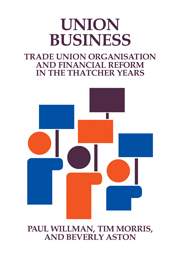Book contents
- Frontmatter
- Contents
- Acknowledgements
- 1 Introduction: unions in the 1980s
- 2 The financial status of British trade unions 1950–1989
- 3 Financial differences between unions
- 4 The role of financial matters in union organisation
- 5 The politics of union finaces
- 6 Union size, growth, and financial performance
- 7 Strike activity and union finances
- 8 The National Union of Mineworkers: strikes and financial disaster
- 9 The GMB: merger and financial reform
- 10 The Amalgamated Engineering Union: back from the brink
- 11 The Banking, Insurance and Finance Union: competitive unionism and financial survival
- 12 The Electrical, Electronic, Telecommunications and Plumbing Trade Union: accountability and financial control
- 13 Conclusions: union business and business unionism
- Appendix 1 Research methods
- Appendix 2 Regression results
- Appendix 3 Questions for finance officers
- Appendix 4 Questions for General Secretaries
- Appendix 5 Questionnaire: trade union finances
- Appendix 6 The number of trade unions
- Notes
- References
- Subject index
- Index of trade unions
- Author index
Appendix 4 - Questions for General Secretaries
Published online by Cambridge University Press: 11 March 2010
- Frontmatter
- Contents
- Acknowledgements
- 1 Introduction: unions in the 1980s
- 2 The financial status of British trade unions 1950–1989
- 3 Financial differences between unions
- 4 The role of financial matters in union organisation
- 5 The politics of union finaces
- 6 Union size, growth, and financial performance
- 7 Strike activity and union finances
- 8 The National Union of Mineworkers: strikes and financial disaster
- 9 The GMB: merger and financial reform
- 10 The Amalgamated Engineering Union: back from the brink
- 11 The Banking, Insurance and Finance Union: competitive unionism and financial survival
- 12 The Electrical, Electronic, Telecommunications and Plumbing Trade Union: accountability and financial control
- 13 Conclusions: union business and business unionism
- Appendix 1 Research methods
- Appendix 2 Regression results
- Appendix 3 Questions for finance officers
- Appendix 4 Questions for General Secretaries
- Appendix 5 Questionnaire: trade union finances
- Appendix 6 The number of trade unions
- Notes
- References
- Subject index
- Index of trade unions
- Author index
Summary
FINANCIAL MATTERS, NEC
Assuming the NEC is the responsible authority, who raises financial matters on the NEC?
How often does the NEC discuss finance?
Is monitoring of the financial situation built into the timetable?
What financial issues would worry the NEC? Monthly cash-flow problem?
Is there a financial policy?
Do members of the NEC ever take financial initiatives?
How often do you monitor the accounts?
THE FINANCE OFFICER
How does the finance officer get his advice/views over?
Can he speak to the NEC?
Does he work through the GS?
Does he write financial reports? How often?
Is there a mechanism by which he can address members?
CONFERENCE
As conference decisions tend to involve costs, how does the GS get across to members that there are financial constraints?
Does the Chair of the Finance Committee address Conference?
Are members informed of the costs of strikes, campaigns, etc., and how are they informed? What conference decisions tend to be the most financially challenging?
Fixed levels of strike pay? Campaigning initiatives?
CONTINGENCY PLANS
If the union is in difficulties do you have any contingency plans to cut costs? What is immediately expendable?
- Type
- Chapter
- Information
- Union BusinessTrade Union Organisation and Financial Reform in the Thatcher Years, pp. 228Publisher: Cambridge University PressPrint publication year: 1993



